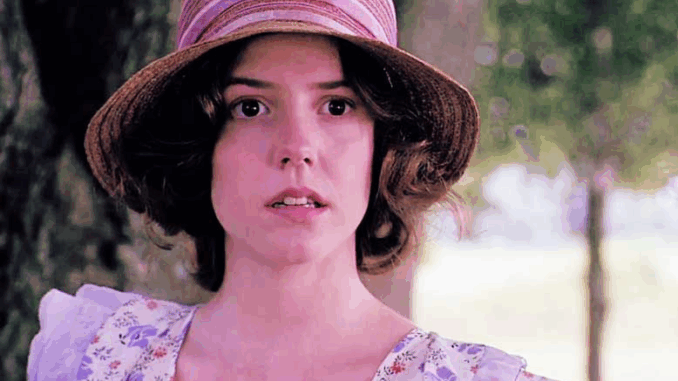
The Quiet Flame at the Heart of Whistle Stop
In a film filled with bold characters and unforgettable moments, Ruth Jamison stands apart—not because she’s the loudest or most daring, but because she’s the calm, enduring force that holds the entire emotional world of Fried Green Tomatoes together. Portrayed with heartbreaking grace by Mary-Louise Parker, Ruth is a character of extraordinary inner strength, empathy, and quiet courage.
While Idgie Threadgoode brings fire and rebellion to the screen, Ruth brings light and warmth. She is the moral center, the nurturer, the heart. Her arc—from obedient Southern belle to emotionally empowered woman—is one of the film’s most moving transformations. This article explores the depth of Ruth’s character, the relationships that shape her, and the powerful legacy she leaves behind.
The Southern Lady in a Cage
When we first meet Ruth, she seems to embody the traditional Southern ideal of femininity: sweet, polite, religious, soft-spoken, and graceful. She’s engaged to be married to Frank Bennett, a charming man on the surface but ultimately revealed to be controlling and abusive. Ruth, like many women of her time, is trapped by social expectations and gender roles.
She teaches Sunday school. She wears white gloves. She says the right things. But beneath her gentle demeanor lies a woman quietly suffocating under the weight of duty, fear, and powerlessness.
Her smile hides sorrow. Her kindness covers bruises. And yet, even in her most repressed moments, there is a glimmer in her eyes that suggests Ruth knows her life could be something more—if only someone would reach in and pull her out.
The Return to Whistle Stop—and a Love That Saves Her
That someone, of course, is Idgie Threadgoode.
After several years apart, Idgie learns of Ruth’s abusive marriage and comes to her aid. The moment Ruth steps off the train into Whistle Stop with her young son in tow, it’s not just an escape—it’s a rebirth.
The home they build together, both emotionally and physically in the form of the Whistle Stop Café, becomes a haven not just for Ruth, but for the entire community. It’s a place where people are fed, welcomed, and cared for. And at the center of it all is Ruth, whose quiet strength and nurturing spirit bring healing wherever she goes.
Their bond, unspoken but unmistakably romantic, is the emotional core of the story. Ruth doesn’t fall in love with Idgie in a dramatic moment—it happens gradually, through shared laughter, compassion, and survival. Their love is built on trust and time, on sacrifice and forgiveness. It is a quiet revolution, especially in a time and place where such a relationship would have been forbidden.
A Mother, A Partner, A Survivor

Ruth is many things: a mother, a caregiver, a woman of faith, and a survivor of domestic violence. But above all, she is a builder of emotional homes. She gives people the freedom to be themselves. She allows Idgie to be wild without fear. She protects her son from the trauma of his early life. She builds a world where love is not conditional, and kindness is never weakness.
Her role in the film isn’t flashy or rebellious—but it is radical in its gentleness. In a world where women often have to yell to be heard, Ruth whispers. And somehow, that whisper echoes across generations.
The Strength Behind the Smile
There’s a moment in Fried Green Tomatoes when Ruth, already weakened by terminal illness, holds Idgie’s hand and says, “I love you.” The words are simple, but they carry the weight of a lifetime.
Ruth never had the luxury of a loud life. She didn’t smash windows or chase trains. But she endured, and she chose love in a world that offered her fear. That, in itself, is an act of rebellion.
Even in her final days, Ruth’s concern is not for herself, but for the people she’s leaving behind. She arranges for her son’s future. She urges Idgie to carry on. She dies not with bitterness, but with grace and gratitude—knowing she created something beautiful while she could.
A Symbol of Enduring Love and Feminine Grace
Ruth represents the kind of love that doesn’t seek attention. Her presence is felt in the warmth of the café, in the meals served with care, in the quiet safety of her home. She’s a symbol of selfless devotion and enduring grace.
In many ways, she’s the spiritual twin of Ninny Threadgoode, the older woman in the film’s modern-day storyline. Both are storytellers in their own way. Both are the emotional anchors in the lives of women searching for identity. And both remind us that life’s greatest acts of bravery often happen in kitchens, nurseries, and conversations, not in battlefields.
Ruth and Idgie: A Love That Endures Without Labels
Though the film never labels Ruth and Idgie’s relationship explicitly as romantic (due to early 1990s studio constraints), the emotional and visual language of their love is undeniable.
They build a home together. They raise a child together. They share intimate glances, hold hands, and offer each other unwavering support. They grieve together. They laugh together. They live as life partners, even if the word was never spoken aloud.
This ambiguity, far from weakening their story, actually strengthens its universality. Their love isn’t performative—it’s lived. It’s about partnership, protection, and presence. And it continues to resonate deeply with LGBTQ+ viewers and anyone who’s ever found family in unexpected places.
Legacy: Why Ruth Still Matters
Decades after Fried Green Tomatoes was released, Ruth Jamison remains a character who moves people to tears—not because she was the most dramatic, but because she was the most human.
She reminds us that healing is possible. That quietness doesn’t mean weakness. That love can look many ways—and all of them are valid.
In a time when storytelling often favors spectacle, Ruth offers us something more precious: emotional clarity, inner strength, and lasting compassion. She is the stillness in the storm, the lantern on the porch, the soft voice in the dark saying, “You’re safe now.”
Final Thoughts: A Rose That Grew in Silence
Ruth Jamison’s story is not just about survival—it’s about transformation. She begins as a woman controlled by others and ends as a woman defined by love, choice, and quiet power.
Mary-Louise Parker brought her to life with the kind of performance that doesn’t shout for awards, but instead settles into your soul and stays there. Through her, Ruth became not just a character, but a symbol—for women who survive, for love that doesn’t fit labels, and for strength that doesn’t need noise to be seen.
